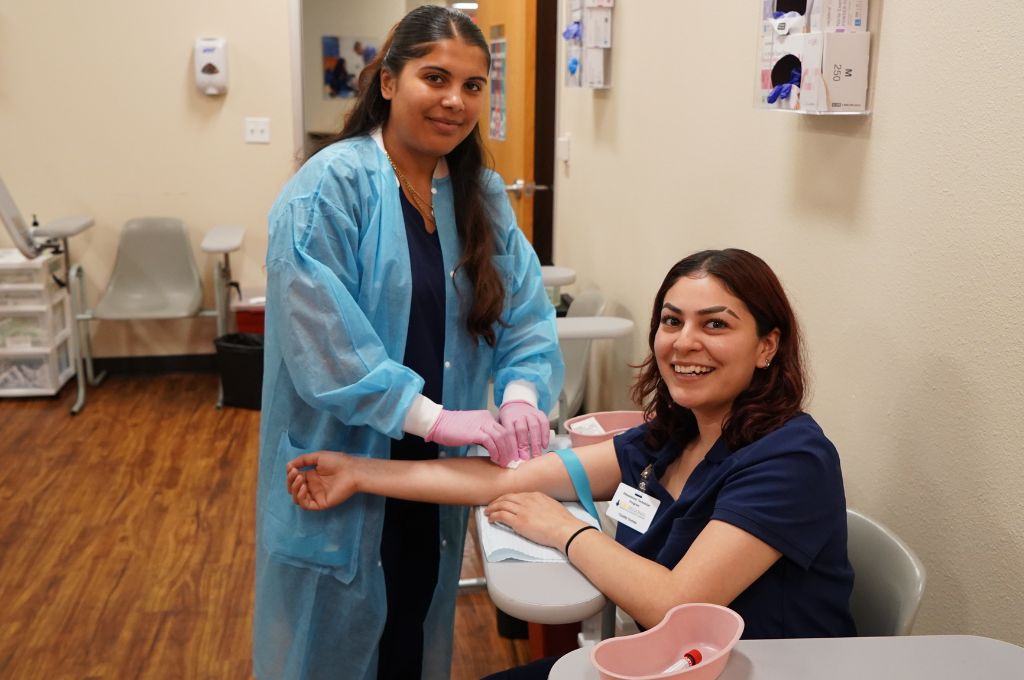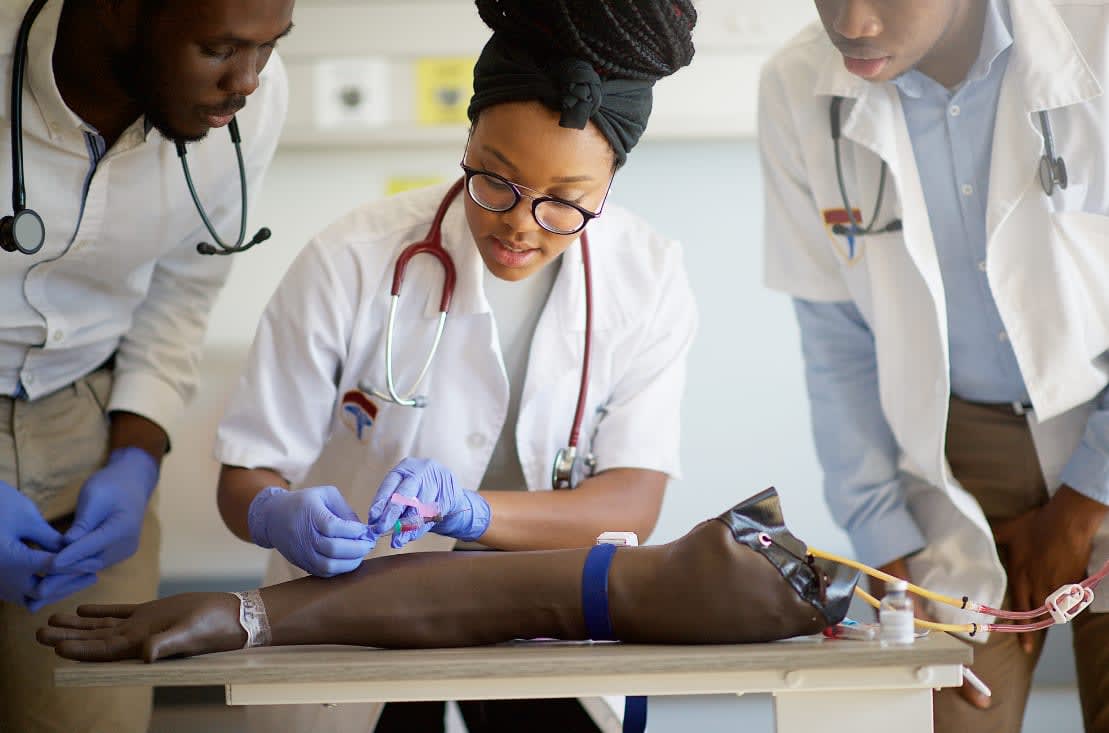The Course to Qualification: Understanding the Phlebotomy Educating Program Journey and Its Significance
As you take into consideration the path to qualification in phlebotomy, it is very important to recognize the role you'll play in healthcare. Your training will cover vital abilities, from blood collection strategies to patient communication. Each component of the program prepares you for the obstacles ahead. What exactly does the trip require, and why is qualification so critical for your future profession? Let's check out these questions further.

The Function of Phlebotomists in Healthcare
Phlebotomists play a crucial function in the healthcare system, functioning as the essential web link between people and vital analysis screening. You'll perform blood attracts, ensuring examples are collected precisely and securely. Your know-how helps in identifying medical conditions, monitoring health and wellness, and leading treatment decisions.
In your everyday communications, you'll require to establish trust fund with clients, making them really feel comfy during what could be a demanding experience. You are in charge of classifying and handling examples meticulously to avoid contamination or mistakes, which can affect test outcomes.
Past this, you'll commonly function along with doctors and nurses, communicating crucial information about clients' conditions. By mastering your skills, you add meaningfully to patient care, making you an essential part of the clinical group.
Review of Phlebotomy Training Programs
When discovering phlebotomy training programs, you'll locate different types developed to fit different routines and learning styles. Each program aids you create necessary abilities like blood collection and client interaction. Understanding these options is key to picking the ideal path for your profession.
Sorts Of Educating Programs
A number of kinds of training programs are available for those looking to end up being competent in phlebotomy. Furthermore, some hospitals and centers offer on-the-job training programs, supplying sensible experience while you learn. Whatever course you pick, each program aims to furnish you with the essential skills for a successful phlebotomy job.

Secret Skills Established
Understanding phlebotomy requires a collection of crucial skills that are created with comprehensive training programs. Furthermore, communication skills are basic; you'll require to communicate with patients, describe procedures, and placed them at simplicity. Each of these abilities is vital for your success as a certified phlebotomist, making you a useful asset in any kind of healthcare setup.
Key Elements of a Phlebotomy Program
In a phlebotomy program, you'll focus on necessary subjects that lay the groundwork for your future job. You'll engage in hands-on training that permits you to apply what you've found out in real-world settings. Both the core curriculum and functional experience are vital for your success as a phlebotomist.
Curriculum Review
While pursuing a phlebotomy training course, you'll run into a curriculum developed to outfit you with fundamental skills and knowledge. Phlebotomy school. This educational program generally consists of makeup and physiology, concentrating on the circulatory system and understanding blood elements. You'll likewise learn more about different sorts of blood collection techniques, consisting of venipuncture and capillary slit strategies
In addition, infection control and security procedures are vital components, ensuring you recognize just how to preserve a sterilized environment. You'll research patient communication, highlighting communication and compassion, which are important for alleviating client anxiety.
Hands-On Training Experience
Obtaining hands-on experience is a vital part of your phlebotomy training program. This practical training permits you to apply what you have actually learned in a real-world setup, enhancing your skills and self-confidence. Phlebotomy Classes Near Me.
Furthermore, you'll obtain the possibility to connect with patients, which is necessary for developing your communication abilities. This combination of technical effectiveness and interpersonal skills is essential for your success as a certified phlebotomist. Eventually, hands-on training is where concept meets practice, solidifying your expertise and readiness for accreditation.
Qualification and Licensing Requirements
Before you can start your occupation in phlebotomy, it is essential to understand the accreditation and licensing needs that differ by state. A lot of states call for phlebotomists to hold a qualification from a recognized organization, such as the National Phlebotomy Association or the American Culture for Scientific Pathology. These qualifications generally include passing an examination that checks your knowledge and abilities in the area.
Along with certification, some states have particular licensing demands. You may require to finish a particular variety of this link hours in professional technique, send evidence of training, or undertake a history check. It is essential to investigate your state's laws to make certain you meet all necessary criteria.
Remaining educated concerning these needs not just assists you protect a setting however also enhances your integrity as an expert. By meeting these requirements, you'll be well on your means to an effective occupation in phlebotomy.
Hands-On Training and Practical Experience
Hands-on training and practical experience are necessary parts of your phlebotomy education and learning, as they enable you to apply academic expertise in real-world circumstances. During your training, you'll take part in monitored venipuncture, discover proper strategies, and come to be aware of various blood collection tools. This direct involvement is critical for constructing your confidence and honing your abilities.
You'll work closely with knowledgeable professionals that can assist you through the subtleties of individual interaction and example handling. Each session not just strengthens your understanding but additionally prepares you for the hectic atmosphere of healthcare setups.
Additionally, several programs integrate clinical turnings, allowing you to experience varied settings, from health centers to outpatient centers. This direct exposure assists you adjust to different obstacles and client demands, ensuring you're well-prepared for your future function. Welcome these chances, as they're essential to ending up being a proficient and caring phlebotomist.
Challenges Dealt With Throughout Training
While acquiring hands-on experience is crucial, it is essential to acknowledge the obstacles that can arise during your phlebotomy training. You could encounter stress and anxiety when doing treatments on real individuals, specifically if you're new to the atmosphere. The stress to obtain every little thing right can be overwhelming. Furthermore, grasping the abilities needed for blood attracts takes practice; you may have a hard time with strategy originally.
Time monitoring can additionally be a hurdle, as balancing theory, useful sessions, and personal commitments can feel intimidating. You may face varying learning paces among your peers, resulting in feelings of insecurity if you believe you're falling back. Adapting to the various characters of trainers can be difficult, as each may have an unique training design.
Acknowledging these challenges early can prepare you for success and assist you read the full info here develop resilience throughout your training trip.
Occupation Opportunities After Accreditation

As you acquire experience, you could even take into consideration specializing in locations like pediatric or senior citizen phlebotomy, satisfying details client demands. Some phlebotomists choose to advance their professions by coming to be laboratory professionals or pursuing additional education and learning in healthcare areas.
Furthermore, your qualification can lead to roles in training or managing new phlebotomists, permitting you to share your understanding. With the medical care sector constantly expanding, your abilities will certainly constantly be in demand, paving the method for a secure and meeting career. Welcome the opportunities waiting on you!
Regularly Asked Inquiries
What Is the Typical Duration of a Phlebotomy Training Program?
Phlebotomy training programs normally last around 4 to 8 weeks. You'll participate in hands-on practice, class instruction, and online knowing. Finishing this training prepares you for accreditation and a fulfilling career in healthcare.
Are Online Phlebotomy Courses Available?
Yes, on-line phlebotomy programs are offered. They provide versatility and benefit, permitting you to research at your very own speed. Simply confirm the program is recognized to satisfy accreditation demands and acquire important skills for your career.
Just How Much Does Phlebotomy Training Usually Price?
Phlebotomy training normally sets you back between $700 and $2,500, depending on the program and area. You need to take into consideration aspects like program length, consisted of products, and hands-on experience when selecting the right training for you.
What Are Typical Requirements for Phlebotomy Training?
Typical prerequisites for phlebotomy training usually include a secondary school diploma or GED, immunizations, and a background check. Some programs may also need basic medical care understanding or qualifications, ensuring you're planned for hands-on training.
Can I Work While Finishing My Phlebotomy Training?
Yes, you can work click over here while finishing your phlebotomy training. Many trainees equilibrium jobs with their researches, but ensure to manage your time successfully to assure you satisfy both job and training commitments effectively.
Comments on “Top Concepts You Should Consider Before Enrolling in a Phlebotomy Training Course”